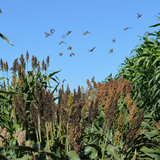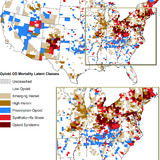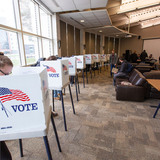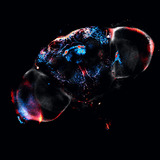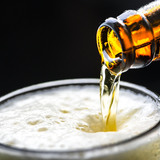News Archive
Tuesday, December 10 2019
-
Sorghum study illuminates relationship between humans, crops and the environment in domestication
A new study illustrates the concept of a domestication triangle, in which human genetics interact with sorghum genetics and the environment to influence the traits farmers select in their crops. The concept gives a more complete systemic picture of domestication.
-
Regional trends in overdose deaths reveal multiple opioid epidemics, according to new study
A recently published study shows the United States in the grip of several simultaneously occurring opioid epidemics, rather than just a single crisis. The epidemics came to light after the researchers analyzed county-level data on drug overdose deaths. The study highlights the importance of different policy responses to the epidemics rather than a single set of policies.
-
National Academy of Inventors recognizes Iowa State’s Narasimhan, Rao
Iowa State's Balaji Narasimhan and Guru Rao are part of the latest class of fellows elected to the National Academy of Inventors. Narasimhan is being recognized for his work in nanomedicines and biomedical engineering; Rao for his work in biochemistry.
-
AAAS recognizes six researchers for distinguished work advancing science
The American Association for the Advancement of Science has named six researchers affiliated with Iowa State University to this year's class of AAAS fellows. The researchers are being recognized for distinguished work in biological sciences, chemistry, engineering and agriculture.
-
Warren slipping as Buttigieg continues to surge
Support for Sen. Elizabeth Warren has dropped by nearly 10% over the past month, according to the latest Iowa State University/Civiqs poll of Democratic presidential candidates. This shift has helped propel Mayor Pete Buttigieg to the top of the poll, with 26% of those surveyed s electing Buttigieg as their top choice.
-
Six books and counting: Iowa State student gets jump-start on writing career
Ryan Byrnes, an Iowa State University senior in technical communication, is an entrepreneurial author. After years of writing, self-publishing and marketing his novels, Byrnes’ most recent work, a historical fiction novel set in World War I, was picked up by a publishing company.
-
NASA’s TESS helps astronomers study red-giant stars, examine a too-close planet
Iowa State astronomers are part of an international team that has been analyzing data from NASA's TESS Mission. The astronomers describe their study of two red-giant stars -- older, “retired” stars no longer burning hydrogen in their cores -- in a paper recently published by The Astrophysical Journal.
-
Iowa State University scientists organize software competition to advance understanding of genetic function
Sequencing a genome doesn't necessarily reveal the functions of individual genes. An Iowa State University scientist helps to organize a competition to evaluate the accuracy of software programs that predict gene function. The recently published results of the latest competition included 144 entries from 68 teams.
-
Money spent on beer ads linked to underage drinking
Advertising budgets and strategies used by beer companies appear to influence underage drinking, according to new research from Iowa State University. The findings show that the amount of money spent on advertising strongly predicted the percentage of teens who had heard of, preferred and tried different beer brands.
-
Iowa State delivers $3.4 billion impact to state economy
Iowa State University’s $3.4 billion impact on the state of Iowa reflects service to families, communities and businesses and benefits to society from an expanded economy and improved quality of life, according to an economic impact and investment analysis conducted for the Iowa Board of Regents.
-
More Americans struggle to fall asleep, stay asleep
A new Iowa State study finds more Americans have trouble falling asleep and staying asleep. Researchers cannot point to a specific reason why, but they suspect technology may be to blame.
